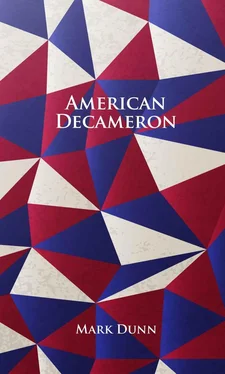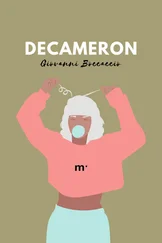It wasn’t over.
Place number 766 was also a 9. Astonishing. Remarkable. Five 9s in a row! How far, Barend wondered, would this phenomenon extend itself?
Farther still, it turned out.
Place number 767 was a 9 as well. Six 9s all lined up together. It was beyond remarkable. It was unbelievable. Kleerekoper calculated the odds of any chosen number sequence of six digits occurring this soon in the decimal representation of pi at 0.08 percent. “Quite unusual, yes?” he put to Jim with a level of giddy animation the boy had never seen from him before.
Jim nodded and grinned. “Do you think the nines will keep going on and on?”
“I rather doubt that.”
“But what if they do?”
Kleerekoper thought about this. He shook it off. “Nonsense.”
It was nonsense. The next number wasn’t a 9. It was an 8. Still — all those 9s — a sextet of identical numbers appearing so early in this seemingly random sequence of digits that was supposed to go on and on and on into infinity…
Like God.
“Pi is God?”
“That’s not what I’m saying, Professor.” Jim looked at the number, which Kleerekoper had typed up on a piece of paper and put before him. Kleerekoper had circled the six nines and underlined them, had even put an exclamation point beneath them.
“Then what are you saying? And what have I told you about speaking clearly and precisely? There is no room for ambiguity in our discussions.”
“Pi isn’t God, Professor. But I think God is there. Those six nines — I think that was God, um, winking at us.”
Barend Kleerekoper smiled and scratched his head. “Interesting deduction. So this God of ours — he sets the universe in motion, and then he steps back and allows what will happen to happen, except that…”
“Except that sometimes He, well, winks . To let you know He’s still there.”
“Absolutely ridiculous and end of discussion,” said Kleerekoper with finality. “Let’s have a slice of that cake your mother left. Why do they call it ‘pineapple upside-down cake’? It looks right-side-up to me.”
At some time between 1961, when an IBM 7090 computer in New York City calculated pi to the 100,265th decimal point and 1966 when an IBM 7030 computer in Paris calculated the number to the 250,000th decimal point, the important decimal place of 193,034 was reached. It is important for this reason: it is the point at which the next sequence of six identical consecutive numbers finally makes its long-delayed appearance.
You may be interested to know that this second set of sextuplets also happens to be…nines.
Wink.
There were three men in the room. The oldest was in his late seventies. The other two were significantly younger. The old man sat behind a desk. The other two men, having just entered the room, gravitated to the window.
It was a fine view.
The three men were meeting on the top floor of a building which, while not the tallest skyscraper in town (that would be the twenty-nine-floor gothic-deco Sterick Building), did happen to distinguish itself in its own way. It was white. Shimmering white. And its architectural design was derived from one of the most famous skyscrapers in the world: the Woolworth Building in New York City. (Though it stood not nearly so tall as its five-and-dime Manhattan inspiration.)
“Either of you boys been up here before?” the old man asked casually. Both men shook their heads. “You ever heard of Irving Block Prison?”
One of the men nodded. The other shook his head. The old man answered as if both had replied in the negative. “Stood right on this spot. Irving was the Union Army’s military prison after the city’s capture. One of the reasons for the second Battle of Memphis was to free the Confederate sympathizers whom the Yankees had locked up here. Of course, the attack on the prison didn’t go nearly as well as General Forrest would’ve liked.”
The old man didn’t mention that the building from which the two visitors were presently enjoying their exalted twenty-second-story vantage point had been built by the very man whom they had come to see: Lloyd T. Binford, president of the Memphis branch of the Columbia Mutual Insurance Company. Appropriately called the Columbia Mutual Tower, the downtown structure housed not only the Memphis offices of that large, esteemed insurance firm, but the headquarters, as well, of the Memphis Censor Board. As it so happened, the insurance company president was also the head motion picture cop for the Bluff City.
Lloyd T. Binford was a man who loved movies. Except for those movies which he, well, didn’t love.
And that’s why the two men were here. They were emissaries of Memphis’s downtown movie houses — beautiful buildings in their own way: ornate movie palaces whose seats sometimes sat nearly empty. It wasn’t that Memphians didn’t like to go to the picture show. It was just that Lloyd T. Binford sometimes made it hard for them to see the movies they wanted to see here. In Memphis. They’d usually have to leave town — go to West Memphis, Arkansas, for example. West Memphis sat on the other side of the Mississippi River, just west of a broad, empty floodplain. West Memphis theatre owners did land-office business exhibiting all those movies that Mr. Binford had banned in Memphis.
“I take it you boys didn’t just come for the scenery,” said Mr. Binford with a pleasant, avuncular smile. The smile came with some effort: Binford’s face drooped a little in its lower half as was its wont, partly from the gravitational pull of the aging process, but also from the tug of his permanent declivitous pout. “Nor do I think that you’re here to get me to reverse my decision on Curley .”
“No,” said the taller of Mr. Binford’s two visitors, though his head was nodding affirmatively. “If all the powers that be at United Artists can’t induce you to change your mind about that picture, I’m sure my inconsequential little Princess Theatre could do no better.”
The taller man moved to take one of the two empty chairs positioned on the other side of the desk.
“But surely you must understand my reasoning,” said Binford, tapping a forefinger on his desk’s blotter. “Have I not made myself perfectly clear on this?”
The other man, who was Jeff to the first man’s Mutt, answered for his partner: “It’s the usual, isn’t it? The picture’s got colored kids sitting side by side in a classroom with white kids. It’s because the picture’s integrated.”
Binford leaned forward, scarcely dropping a shadow on the great expanse of oak. “Which Memphis isn’t.”
“We aren’t here to discuss Curley , sir,” said the first man. “That horse has already left the barn. We’re here to talk about all the horses still inside.”
“Gentleman, let us not waste time rehashing my feelings about black folk on the screen. Memphis doesn’t recognize social equality between the races, and that goes for children, too. As head of the Censor Board, I do my very best to give the people of this city what they feel comfortable with.”
The second man — the short and dumpy one — now sat down next to his companion. “But Mr. Binford, if they aren’t comfortable with these kinds of pictures, why are they all getting in their cars and driving out of town to see them? And that’s the point of our coming to see you today. Mr. Seale and I represent the interests of nearly every theatre owner in Memphis. We’ve been losing money to theatres in West Memphis and Desoto County, Mississippi, for years — ever since you got appointed head of the Censor Board. ‘Banned in Memphis’ is big business for our out-of-town competitors. At the risk of giving offense, sir, these interdictions of yours — and your fondness for taking the scissors to movies with scenes that you don’t like — it’s all very bad for local folk in our line of work. And, to put it, if I may, into civic terms, it reduces taxable revenue for the city. So on behalf of all concerned, we implore you and the rest of the Censor Board to demonstrate a little more lenience when it comes to the films you may wish to ban or expurgate.” Turning to his companion: “Did I say ‘implore’?”
Читать дальше












